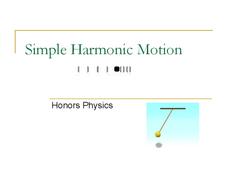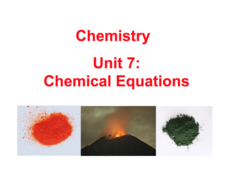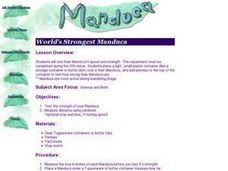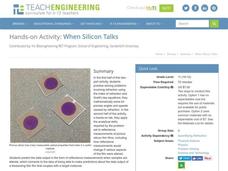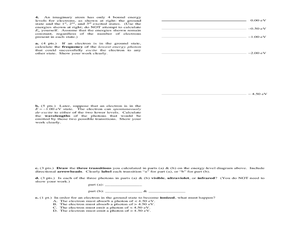Curated OER
How Does Flowing Water Shape a Planet's Surface?
Students investigate how flowing water influence landforms. In this earth science lesson, students observe water behavior as it flows from the stream table at various inclinations. They discuss whether water shaped Mars landforms or not.
Curated OER
Meteor, Meteoroid, Meteorite: What's the Difference?
Learners explore the difference between a meteor, meteorite and meteoroid. In this space science lesson, students first read information about these space bodies. Learners make Comet Cookies and use them to model a meteor shower with a...
Curated OER
Newton's 2nd Law
Fourth graders discuss Newton's Second Law of Motion, and the acceleration of fast and slow moving objects. They experiment with items with different masses to determine the effect mass has on acceleration using a toy car. They complete...
Curated OER
The New Wind Turbine
Students study the basic components of a modern wind machine. In this investigative lesson students investigate and find out if there are any wind machines in their state, how many and how much power they produce.
Curated OER
Curricular Correlations
First graders listen to prerecorded sounds and put them into categories. They discus the sounds that would be heard outdoors, and indoors. They go outside for a few minutes and take a "hearing walk." Then they come inside and close their...
Curated OER
Electrons and Atoms
In this atoms worksheet, students determine the velocity, wavelength, power, and frequency of given atoms. Student describe wave-particle duality and give the principle and angular quantum numbers for given orbitals. This worksheet has...
International Technology Education Association
Tidy Up Those Sloppy Force Fields!
It is just magnetic. This resource presents the concept of Earth's and another planet's magnetic field and how spacecrafts detect them. Learners study a problem using magnetometers and participate in three experiments to come up with a...
NASA
Developing an Investigation
Watch as your class makes the transition from pupils to researchers! A well-designed lesson has scholars pick a solar wind characteristic to research. They then collect and analyze official data from the LANL website. This is the...
American Museum of Natural History
Cosmic Connection
Do you see what I see? Individuals view eight images from the Hubble Space Telescope and then determine exactly what is being shown in the images. The pictures range from the rings of Saturn to views of billions of galaxies that take up...
Curated OER
F = ma, Inertia, and Action-Reaction
Fourth graders apply concepts of Newton's Laws in scientific inquiries. Use this lesson to have your charges test and identify the characteristics of objects that make them easier or harder to push. After a teacher-led demonstration,...
Curated OER
Reading Comprehension: Thunder and Lightning
Thunder and lightning are so exciting! Your class gets to read all about it. This informational reading passage provides them with a scientific explanation of thunder and lightning. They read the passage, answer comprehension questions,...
Physics Classroom
Action-Reaction Lab
Computer-interfaced motion detectors are required to carry out this inquiry. It is a new twist on exploring motion with plunger carts: they are set back-to-back and then propelled away from each other. Their velocities are measured, and...
Curated OER
Simple Harmonic Motion
Back and forth, and back again. A presentation on harmonic motion would make a great backdrop for a directed instruction lesson in Honors Physics. It includes diagrams, formulas, graphs, and a few sample problems.
It's About Time
Slinkies and Waves
Slinkies® are a great tool for visualizing waves. Pupils work in groups to create both transverse and longitudinal waves before using a polarizer to analyze the ways they are able to travel.
Normal Community High School
Chemical Equations
Viewers learn how to identify the substances in a chemical reaction, how to balance it, and the different types of chemical reactions by watching a presentation that also includes a review of monomers and polymers. The presentation...
Glynn County School System
The Outer Planets
Are outer planets just like inner planets? Nope! The outer planets are much more spread apart than the inner planets. An informative PowerPoint presentation shows why this is true as well as facts about the individual planets in the...
Curated OER
Modern Physics, The Quantum
In this physics worksheet, young scholars examine the relationship between the discrete and continuous spectrum alongside other concepts for the 9 questions.
Curated OER
World's Strongest Manduca
Students test the strength and speed of their Manduca. They keep their insect in a small dish and wiegh it down with pennies. They share their observations with the class.
Curated OER
The Sun
In this sun worksheet, students are given a diagram of 8 structures of the sun and they label each structure with a given term. They also fill in 8 blanks to complete sentences about the sun, its characteristics and the layers of its...
Curated OER
Ways to See the Sun
Pupils examine how the regions of the Sun are studied using spectroscopy. They investigate the electromagnetic spectrum and the types of radiation that are associated with it. They use prisms and CD's to examine the light spectrum. They...
Teach Engineering
When Silicon Talks
Explore Snell's Law using thin films. In the fifth installment of a seven-part series, pupils solve a set of problems relating to Snell's Law and use this skill during an experiment requiring the collection of reflective measurements...
Curated OER
Physics Final Exam, Part A
Here is a comprehensive and cohesive final exam for your high school physicists. A variety of question styles are incorporated, such as multiple-choice and problem-solving. Topics are too many to list, so you will want to review the exam...
Curated OER
Build a Rain Gauge
Students use a glass container, coat hanger, measuring spoons, and more to make their own rain gauge. In this rain gauge lesson plan students measure the rain.
Curated OER
Up in the Air
Students evaluate the impact of volcanic ash on the surroundin environment. Through discussion, videos and activities, they identify the various ways in which volcanic ash can be more detrimental than volcanic magma and lava.














